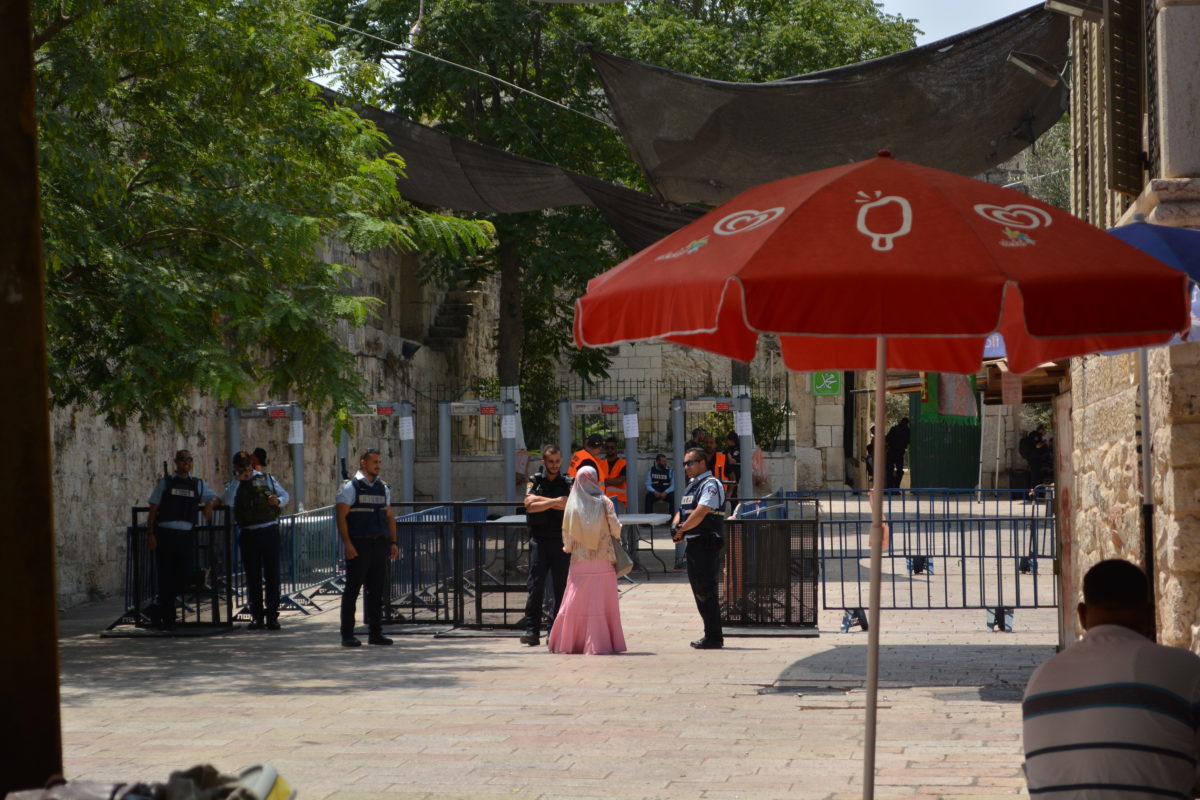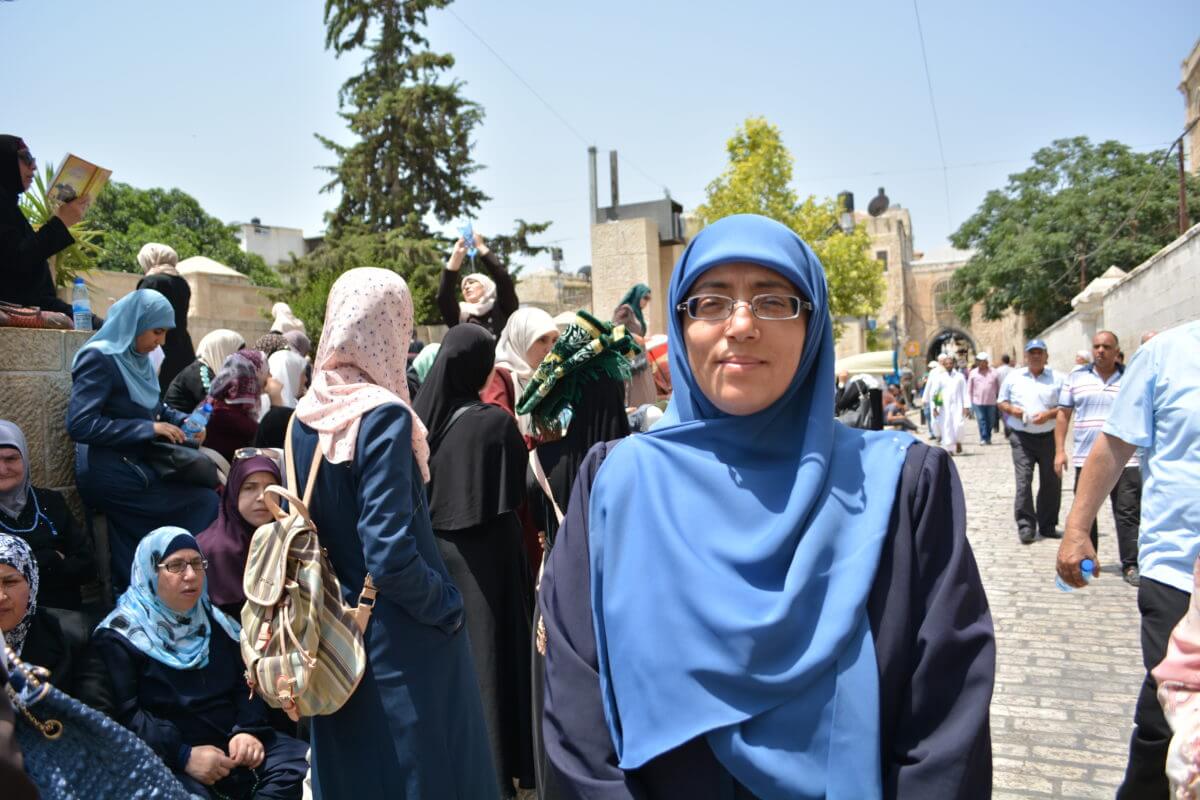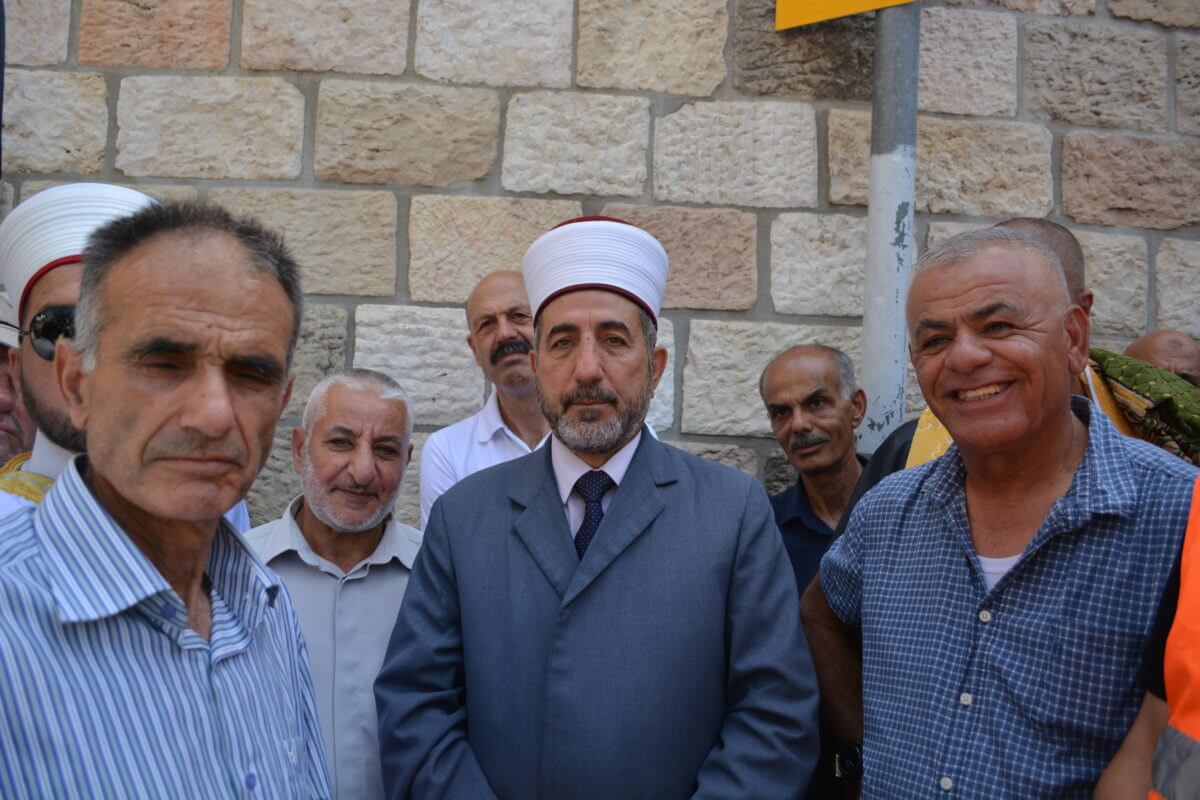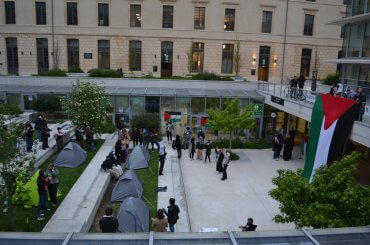East Jerusalem, occupied West Bank — “You have four minutes to leave,” the Israeli police officer yelled aggressively through the megaphone.
The peaceful atmosphere drastically shifted into one of panic within seconds. Girls who were standing on the ledge scrambled to get down to leave, some tripping and falling down over others.
Last Sunday hundreds of Palestinians had lined up in rows inside the Old City’s walls by Lion’s Gate waiting for the late evening prayer. In the hour prior to the beginning of prayer, they occasionally chanted in support of Al Aqsa and the Sheikh delivered his sermon. It was a calm atmosphere where even the officers themselves were standing with relaxed postures, perhaps bored.

However, about ten minutes before the start of the late evening prayer, the mood dramatically changed when the group of officers suddenly straightened their positions and all lowered their visors at the same time.
Once the officer started shouting through the megaphone, panicked voices were heard in the crowd. Some Palestinians started to make their way towards the exit.
Suddenly explosions were heard, causing a stampede towards the exit, but the passageway was too narrow for such a large crowd. A sense of panic and fear ensued as people ran for cover, screaming.
Only a minute had passed from the four-minute deadline, but the officers had already thrown stun grenades and tear gas into the crowd who had been sitting on the ground, waiting to pray. Those who couldn’t make it towards the exit, sought protection behind stone pillars.
This was a typical scene from the Palestinians’ non-violent prayer protests against the Israeli military takeover of Al Aqsa that has so far resulted in the deaths of four Palestinians and over 900 injured within a week.

Palestinians remain alarmed over Israel’s latest unilateral decision to install metal detectors, security cameras, and turnstiles at all the gates leading to the Al Aqsa compound; they see it as an attempt by Israel to change the status quo and eventually gain complete control over Al Aqsa.
Located in occupied East Jerusalem, the Al Aqsa compound, also known as Haram Al Sharif for Muslims and Temple Mount for Jews, is administered by the Jordanian Islamic Waqf. Under a 150-year agreement, only Muslims can pray at the site, while non-Muslims can visit. According to leading rabbis, it is forbidden for any Jew to enter any part of Al Aqsa.
Up until now, Palestinian guards have controlled the entrances to Al Aqsa and who may enter without any metal detectors and security cameras in place.
Palestinians say they’ll continue praying outside of Al Aqsa’s gates in protest until the security measures are removed. Installing them unilaterally without consulting the Islamic Waqf is seen as a way for the Israeli authorities to assert their dominance and control over the site.
Israeli security set up the metal detectors and security cameras after three Palestinians and two Israeli officers were killed in a gun battle at the Al Aqsa Compound on July 14.

“This is just the first step. If we accept these metal detectors it will get even worse. The next step will be to stop people who want to pray from even reaching the Al Aqsa mosque,” Khatija Khiews said, who has been praying outside of Al Aqsa everyday in protest.
“The issue is the occupation itself. The solution is to remove the occupation. It’s the only answer to all of our problems.
“These metal detectors were installed at every gate and we don’t accept to be searched in order to go pray at Al Aqsa. Even if we do go through the metal detectors, we won’t accept to get searched by the police. They shouldn’t even be there,” Khiews said.

Speaking to Mondoweiss from Friday’s prayer at Lion’s Gate, Sheikh Mustafa Tawil fears the latest measure will lead to partitioning the Al Aqsa mosque just like with Hebron’s Ibrahimi mosque in 1994.
“Muslims aren’t allowed to pray at the Ibrahimi mosque on Israeli weekends and holidays. The occupiers want to do the same thing to Al Aqsa mosque,” Tawil said.
“We refuse these gates because they were set up by the occupiers to force their control over the mosque. We refuse the Israelis’ sovereignty over the mosque at all. The metal detectors are just the first step in dividing Al Aqsa mosque.”
Jerusalem’s Old City has already started to resemble Hebron’s military ghost town. Many stores remain closed while groups of fully armed officers are positioned at every corner and open space and have barricaded many alleys.

Unraveling of negotiations by Israel
The negotiations reached in 2014 between Israeli Prime Minister Benjamin Netanyahu and King Abdullah of Jordan in order to maintain peace at the holy site have been unraveling in the past year, especially in the last month, largely due to a “change of policy on the Israeli side,” according to Ofer Zalzberg, a senior analyst at the International Crisis Group.
Among the points agreed upon was to bar all Knesset members from entering the site, to limit entrance for religious Jewish groups and to ban provocative Temple activists and to refrain from imposing age-based restrictions for Palestinian Muslims.
However Israel hasn’t adhered to its commitments.
The prayer ban has been relatively lax following the nomination of the new head of the police’s Jerusalem district Yoram Halevy in January 2016. Since then he has changed the police’s conduct towards Temple activists who seek to change the status quo, Zalzberg explained.
On June 29 when Halevy joined Temple activists visiting the site “he received the priestly benediction from an activist in the group.”
Halevy, a senior official in charge of preserving the ban on non-Muslim worship, “in accordance with a more than 150-year old arrangement” participated in the worship, Zalzberg wrote.
In the last month, police have also imposed age restrictions for Muslims twice in order to protect large groups of Temple activists visiting on those days.
Since the attack, MKs called for closing the Al Aqsa compound for Muslims, threatened with creating a third “nakba” and to build a synagogue on Al Aqsa compound. Likud, Israel’s ruling party launched a petition to raise the Israeli flag over the Al Aqsa compound.
The rise of Temple movements
Once a radical fringe group in politics and religion, since 2000 Temple movements have gained a respectable position within the mainstream right and benefit from close ties with the State of Israel.
The ultimate goal for Temple activists is to eventually destroy the Al Aqsa mosque and the Dome of the Rock to build the Jewish “Third Temple.” The Temple Institute has a blueprint for its construction ready.
According to a 2013 report by Israeli research organization Ir Amim, “The movements’ growing momentum and dangerous provocations to change the status quo are not receiving adequate attention, nor is the disturbing connection between these movements and official Israeli institutions.”
The State of Israel directly funds various Temple movement activities. Along with funding Temple organizations, the Ministry of Education disseminates their ideas through the educational system.
“There is a correlation between the escalation of the Israeli-Palestinian conflict on the Temple Mount/Haram al-Sharif and around it since 2000 and a parallel increase in the activity of Temple organizations,” the report noted.
The current tension could further spike as the ban preventing members of the Knesset from accessing the Al Aqsa compound were lifted on July 23 for a five day trial period in order to test the reaction.
The ban has been in place since October 2015, with the assumption that visits by MKs might spark violence. In 2000, when Likud leader Ariel Sharon visited the holy site accompanied by a 1000 police officers, it helped trigger the second intifada.
Likud MK Yehudah Glick, a leading figure in the Temple movement overturned the ban after petitioning to the High Court. Earlier this month he called for all MKs to ascend to the Temple Mount.
The rise in Temple movements’ prominence has been accompanied with an increase in violent Israeli incursions at Al Aqsa, including detaining and attacking the Al Aqsa guards.
Al Aqsa Compound director Sheikh Omar al-Kiswani stated to media that over 700 settlers, “an unprecedented amount” raided the compound for Jerusalem Day last May.
Every year Israel’s far-right settlers parade through Palestinian neighbourhoods, celebrating Israel’s conquest of East Jerusalem in 1967. The settlers call out for the Al Aqsa compound to be destroyed and shout “Mohammad is dead,” “Death to the Arabs” and other statements calling for genocide of Palestinians.
This past April, Jews from the far-right also held a ceremony near Temple Mount for the first time, where they slaughtered a lamb just a few hundred metres away from the mount.
Shimshon Elboi, active in the Temple Mount movement, was quoted in Haaretz saying, “We were privileged to get near the Temple Mount, the proper place. The authorities today are more open and the public is more open.
“Ultimately the government wants to serve the people, and the people want the Temple; the people want to offer sacrifices. At this rate the day isn’t far off – just a few more years – when we’ll be privileged to do sacrifices on the Temple Mount itself,” Elboi said.
Having historic Palestine reduced to the Gaza Strip and bantustans in the West Bank, Palestinians see the military takeover of Al Aqsa as a red line that can’t be crossed.
“This is our mosque and the occupation has to retreat so we can pray five times again in the mosque,” Sheikh Tawil said.
“We are going to keep praying by the gates of the masjid, until they remove the humiliating electronic gates.
“The world should pressure the occupation politically and economically and besiege the occupation until it listens to the UN resolutions and withdraws to the 1967 borders. The world shouldn’t abandon the Palestinians while watching them get killed, arrested, beaten, humiliated for 50 years until now.”




The RAMBAM was not very enthusiastic about animal sacrifice. Read this passage at the end of Chapter 32 of the Guide for the Perplexed.
Zios continue to practice the idolatry of racist, chauvinist, and nationalist self-assertion against the natives of Palestine.
Normally I would consider the total Zionist lack of respect for the superstition of God to be a good thing, but in this case Zionists express perverted worship for the State of Israel and for the fake concept of the “Jewish” people.
This is surreal.
Thank you Merisha, a highly important article.
Want the hard truth? This is the hard truth. Jerusalem cannot be kept as an open city and have two security services. Not going to happen. Israel is and will remain the only party responsible for security. Another hard truth. Anyone thinking that the Sunni Shiite divide will not hit Jerusalem has yet to recover from a bout of drug induced hallucinations. “Let’s imagine that the Arab world is at peace with each other”. Yeah, dream on. Hard truth: Israel understands the fragility of the Arab world and cannot put the security of the Jewish people in the hands of anyone but itself. Hard truth: If the Palestinians are conditioning their future state on Jerusalem and the Old City being under their sovereignty, then there will never be a Palestinian state. Go and pray at Al-Aksa as much as you want but leave your keys at home. The reaction of Muslism to Jews praying on the Temple Mount is very interesting. It is as if they (the Muslims) believe that Allah will listen to Jewish but not to Islamic prayer. I say Allah because Allah and G-d are the same. Yes, Muslims and Jews pray to the same G-d but the Koran leaves no room for non-Muslims.